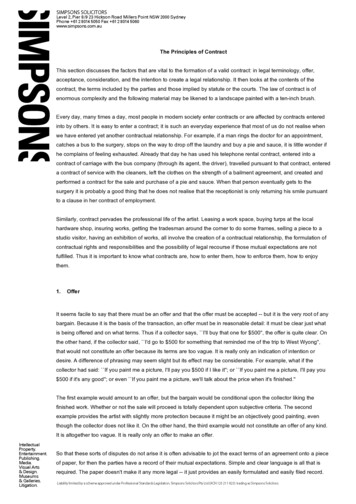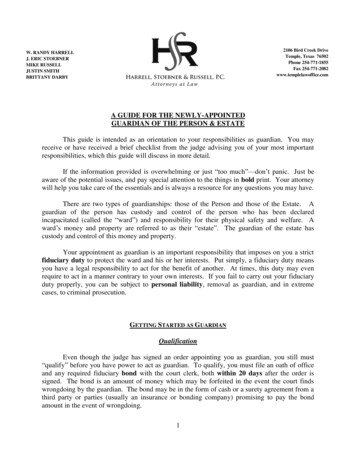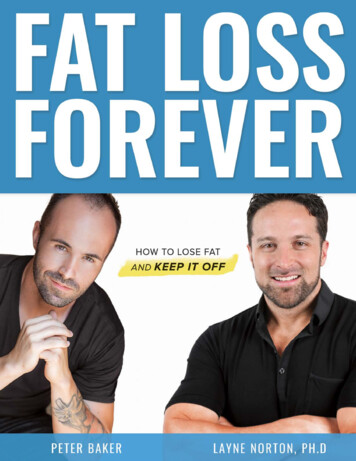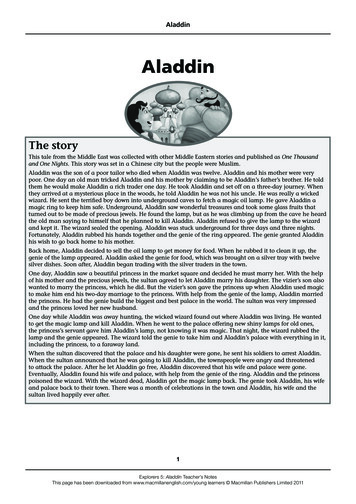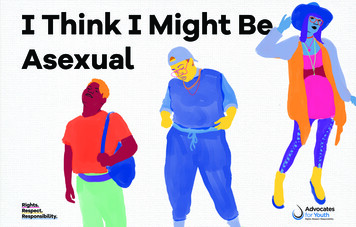
Transcription
I Think I Might BeAsexual
“Trust your gut and allow yourself the graceand gentleness of uncertainty for as longas you need. You have your whole life tofigure out who you are and what you want.You can identify as ace now and changeyour mind later. You can identify as ace butsometimes experience sexual attraction.You can choose to have or not to have sexfor a million valid reasons. None of this ishard and fast, and most importantly, youdon’t owe anyone an explanation. ”- Foster
What Does It Mean to Be Asexual?Someone who is asexual doesn’t experience sexual attraction and/or doesn’t desiresexual contact. Asexuals may also use shorthand like “Ace” to describe their sexualorientation. An asexual person can be straight, gay, bisexual or queer because sexualattraction is only one kind of attraction.An asexual person may or may not identify as LGBTQ. It’s important to ask, andrespect their preference. Someone can still be physically, emotionally, mentally and/or spiritually attracted to someone, date, fall in love and/or get married, even if theydon’t have sex, don’t like sex or don’t want to have sex. Some asexuals may still havesex or masturbate, while others may not. Being ace just means you don’t desire sex.Sex - when you’re born, thedoctor decides if you are maleor female based on if you havea penis or vaginaGender - What definessomeone as feminine ormasculine, including howpeople expect you to behaveas well as how you feel andidentifySexual orientation - to whomyou are sexually attracted.Sexual orientation isn’tdictated by sex or gender;trans folks can be any sexualorientation.Cisgender - When your sexassigned at birth and yourgender match up as societyexpects, as in, someone bornwith a vagina feels like a girl.Intersex characteristics- Someone with intersexcharacteristics has genitaliaand/or chromosomes thatdon’t fit into the typicalmedical binary of female andmale sex.
1
How Do I Know If I’m Asexual — And Is It Normal?Asexuality is completely normal! It’s a healthy sexual orientation just like being gay or beingstraight, and you can still have normal relationships. It can be confusing, trying to figure out ifyou’re asexual, especially since sex is so prevalent in our culture. It may be difficult or take time,and that’s ok! Some people know from a young age that they aren’t, and some don’t figure it out untillater. Both are normal. If you think you might be asexual, try asking yourself these questions:Have you ever been sexually attracted to another person?Do you want to have sex or engage in sexual practices?If you want to date or get married at some point, do you want sex to be a part of thatrelationship?If you’ve had sex or engaged in sexual practices before, was it something you liked? Would youwant to do it again? How were your feelings about the experience different or similar to yourfriends or partners’ experiences?It’s okay if you don’t have answers for these questions yet, or if your feelings are still unclear.Discovering your sexuality/sexual orientation can take time, and sometimes what you call yourselfor how you identify might change. It’s normal for sexuality to change and develop. Only you willknow how to label yourself correctly.
“It’s okay to experiment. It’s okayto have ‘phases’, it’s okay to trylabels out for a while and learnthey don’t fit, or go back andforth. It takes time. And you’renot a ‘bad’ person of your otheridentities for it.”- Noor
What is it like being young and asexual?There can be misconceptions about young asexuals. Some people may assume that you are tooyoung to understand your sexual orientation, however, you are the only one who can know how youidentify. Social media has enabled young people to connect and find other asexual young people.Finding community may be difficult at first, but it’s important to feel connected and supported bypeople that understand you. Many people have blogs or YouTube channels where they talk abouttheir experiences. There may also be groups at your school or on your campus that you can connectwith. Finding people who will support you in your journey can help make it easier.
“I spent years feeling broken andworrying that my anxiety/dysphoria/trauma history were holding me backfrom sex. In truth, asexuality anddysphoria and anxiety are all part ofthe complicated and ever-changingfeelings I have about sex and my body,and that’s ok! ”- Foster
Should I/How Do I Come Out?Coming out is the process of accepting your sexuality, figuring out how open you want to be aboutit and telling those you want to know. You don’t have to come out if you don’t want to, before you’reready, or be open about your sexuality to everyone. However, accepting your sexuality is important,whether or not you come out.If you do choose to come out, it’s important to put your safety first. Start by choosing someone youtrust, like a close friend, a sibling, parent, or a guidance counselor to confide in. There may be a widerange of reactions and having someone to talk to can help. Some people don’t understand what itmeans to be asexual and it may be hard to know who will listen and be supportive. Some friendswill accept you. Others may turn away from you or tell other people without your permission.Telling family can sometimes be difficult. Some families are highly supportive, and some are not.You may choose to tell everyone or very few people, or somewhere in between. Coming out is verypersonal — there is no wrong way to do it.
In a healthy relationship, both partners:Respect oneanother.Enjoyactivitiesindependentof oneanother,as well asUse each others’preferred name andpronouns. Neveruse the wrongpronouns or nameto intentionally hurtyour partner.together.Discuss things calmly, allowfor differences of opinion,and make compromises.Trust oneanother.Embraceeach other’sRespecteach other’sneed fordifferences.privacy.Respect sexualboundaries and are ableto say no to sex.Have room todevelop andmature, andvalue each otherthrough thesechanges.Share sexualhistories andsexual healthstatus withone another.Approachsex anddiscussionsabout sexwith thesame mutualrespect andtrust appliedto other issues
What about healthy relationships?Everyone has the right to be safe and healthy within their relationships, free from physical oremotional coercion.In unhealthy relationships, one or both partners are controlling, demanding, mean, and/orphysically or emotionally abusive. Sometimes it’s not so easy to decide if a relationship should bemaintained the way it is, worked on, or ended before it goes any further. Partners should examinewhat is bothering them and what they would like to see change. Talk over these questions witheach other, or with someone you trust, like a friend, teacher, or counselor. Think about what, ifanything, you can each do to make the other feel more comfortable in the relationship.Healthy relationships rely on clear communication. Saying what you mean in a way that others willunderstand can eliminate many stresses on relationships. You have a right to leave the relationshipif it is not happy and healthy.
How can I practice safe sex if I choose to be active?Some asexuals may choose to still have sex with a partner, so if you do decide to engage in sexualpractices, it’s important to practice safe sex. Being sexually healthy means deciding what you wantand don’t want to do with romantic/sexual partners; communicating clearly about your wants andneeds; and taking precautions to protect yourself if you do decide to have sex. Oral, anal, and vaginalsex, including sex with toys/dildos, all come with some risk of sexually transmitted infectionsincluding HIV. You can prevent many sexually transmitted infections by using condoms. It’s alsoa good idea to get tested for HIV and STIs with new partners. Knowing each other’s status canhelp you make decisions about protecting yourself and your partner. It’s also important to knowthat if someone with a penis and testicles, and someone with a vagina and uterus have vaginalintercourse, they can become pregnant. Use condoms or other birth control if you wish to preventpregnancy. Some people with a vagina and uterus may chose to use birth control even if they aren’tat risk of pregnancy.RisksProtectionOral SexAnal SexVaginal SexHIV andSTIsHIV andSTIsHIV, STIs, andPregnancyCondoms,dentaldam/Dailyuse of PrEPCondoms/Daily use ofPrEPCondoms/Birth Control,Daily use ofPrEP
What about HIV and STIs?HIV, human immunodeficiency virus, is a virus that you get from sexual fluids, from blood, or frombreast milk of a person who has HIV. If you’re having sex, it’s a good idea to get tested regularly soyou know your HIV status. It’s a good health practice to get tested once a year. Knowing your HIVstatus is crucial to getting the care you need to stay healthy. Talking about your HIV status withpartners is important too. That way you can make a plan that helps both of you stay healthy.For oral or anal sex, condoms and dental dams can provide protection against HIV. You can alsoacquire HIV if you share needles for injecting drugs with a person who has HIV. To avoid thisway of transmission, either don’t inject drugs, or don’t share needles. If you think you are likely tobe exposed to HIV, for instance by having sex with a partner who is HIV positive, pre-exposureprophylaxis (PrEP) is a pill your doctor can prescribe that can give additional protection from HIV.It’s also important to know about sexually transmitted infections (STIs). These include chlamydia,gonorrhea, syphilis, HPV, and herpes. Some are chronic and, left untreated, all can have majorimpacts on your health. STIs don’t always come with symptoms so it’s important to ask your healthcare provider about them and get tested regularly. Condoms or dental dams also provide protectionagainst STIs.
“Identifying as asexual has been apowerful part of me claiming spacefor myself and conceptualizing whatI want and need. I still feel a lot ofshame and guilt about establishingboundaries with partners, but it’sbeen so freeing for me to realize that Idon’t need to perform sexuality to beworthy of love and affection.”- Foster
What are my rights?Everyone has the basic human right to be who they are. No one but you has the right to determineyour sexual orientation or how you live.But sometimes, especially for young people, laws, school policies, and authorities don’t reflect ourbasic rights. It’s a good idea to look up laws and policies in your state and school. If your school isn’tsupportive of asexuality (for instance, sex ed classes don’t include information about being ace), andyou’re interested in working to change that, visit www.advocatesforyouth.org to find a community ofyouth activists who are working for acceptance and legal rights for LGBTQIA young people.
Where can I go if I am feeling unsafe or need support?Think about supportive adults you know – is there a friend, neighbor, teacher, or schoolcounselor you can trust?Search online. There may be supportive groups in your area, or online networks which canprovide support.Check out communities of faith that might be supportive – many congregations have a missionof acceptance of LGBTQ people.Title X clinics must offer confidential and affordable health care to young people, and many offercounseling services. Find by searching “Title X clinic near me.”Check out AMAZE.org, a fun and informative animated videos about sex, your body, andrelationships.
ADVOCATES FOR YOUTH’S MISSION:Advocates for Youth partners with youth leaders,adult allies, and youth-serving organizations toadvocate for policies and champion programs thatrecognize young people’s rights to honest sexualhealth information; accessible, confidential, andaffordable sexual health services; and the resourcesand opportunities necessary to create sexual healthequity for all youth.Citations:1. Bogaert AF. Asexuality: prevalence and associated factors in anational probability sample. J Sex Res. 2004 s4Youth1325 G STREET NW, SUITE 980WASHINGTON DC 20005
Coming out is the process of accepting your sexuality, figuring out how open you want to be about it and telling those you want to know. You don’t have to come out if you don’t want to, before you’re ready, or be open about your sexuality to everyone. However, accepting your sexuality is






